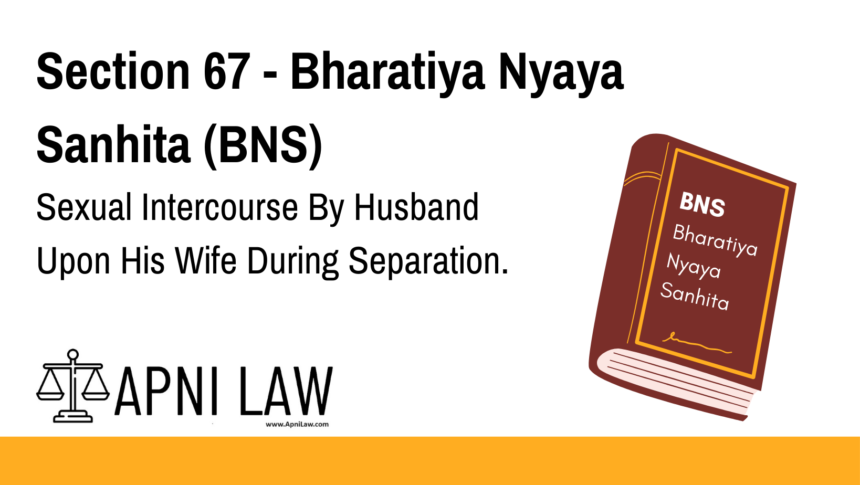Code: Section 67 BNS
Whoever has sexual intercourse with his own wife, who is living separately, whether
under a decree of separation or otherwise, without her consent, shall be punished with
imprisonment of either description for a term which shall not be less than two years but
which may extend to seven years, and shall also be liable to fine.
Explanation.—In this section, “sexual intercourse” shall mean any of the acts mentioned
in clauses (a) to (d) of section 63.
Explanation of Section 67 BNS
Legal Recognition of Marital Rape in Separation Cases
- Section 67 of the Bharatiya Nyaya Sanhita (BNS), 2023, criminalizes non-consensual sexual intercourse by a husband with his wife if they are living separately due to a legal decree of separation or any other lawful reason.
- This provision ensures legal protection for women even within marriage when living apart.
Key Provisions:
- Applicability:
- The husband and wife must be legally separated (e.g., through a court decree or mutual legal separation).
- The wife’s consent is mandatory for any sexual relationship in such cases.
- Punishment:
- Imprisonment: Up to 10 years.
- Fine: The Court may impose a monetary penalty on the husband.
- Distinction from Marital Rape:
- Marital rape (within a subsisting marriage) is not criminalized under BNS.
- However, if the wife is legally separated, forced intercourse is punishable under Section 67 BNS.
Illustrations
Example 1: Husband Forces Himself on Wife During Legal Separation
A woman obtains a court-ordered judicial separation due to domestic abuse. One day, her husband visits and forces himself on her without her consent. Under Section 67 BNS, he can be punished with up to 10 years in prison and a fine.
Example 2: Mutual Consent During Separation
A couple is legally separated but decides to engage in consensual intercourse. Since there is mutual consent, no offense is committed under this section.
Common Questions & Answers
1. Does this law criminalize marital rape in all cases?
No. Section 67 applies only if the couple is legally separated. Marital rape is not recognized as a crime under Indian law if the marriage is intact.
2. What if the wife does not resist but does not give explicit consent?
Lack of explicit consent still amounts to non-consensual intercourse, making the husband liable for punishment under this section.
3. What is the difference between judicial separation and divorce in this context?
- Judicial Separation: The marriage remains legally valid, but the couple lives separately.
- Divorce: The marriage is legally dissolved. Section 67 applies only during judicial separation.
4. Can the wife file a complaint if this happens?
Yes. The wife can approach the police or the court, and the case will be dealt with under criminal law.
Conclusion
Section 67 of BNS is a crucial legal provision that protects women from sexual violence during legal separation. While marital rape remains non-criminalized in intact marriages, this section ensures that a husband cannot force himself on his wife if they are legally separated.
For more legal insights, visit ApniLaw.











